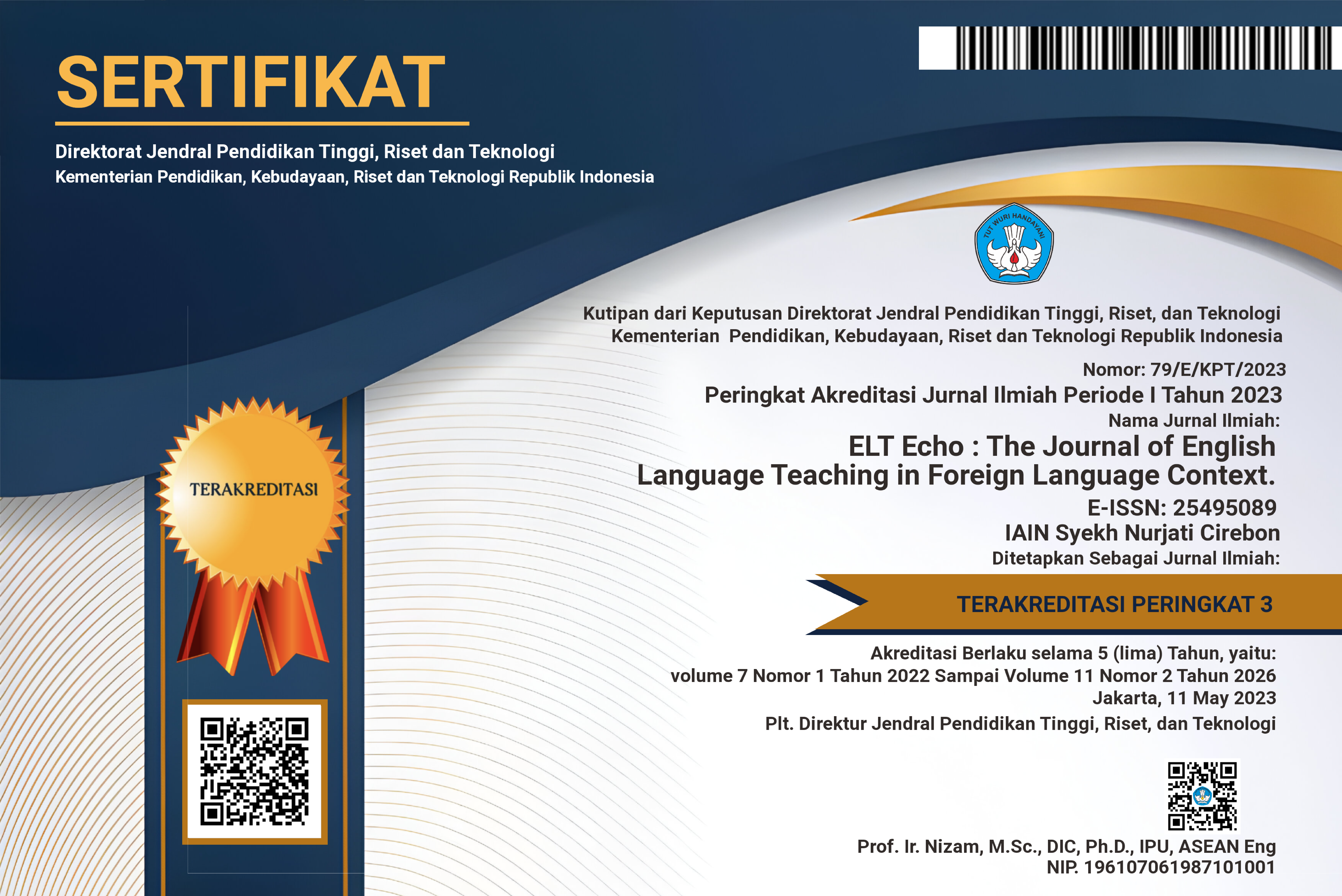THE EFFECTIVENESS OF DICTOGLOSS METHOD ON LISTENING SKILL OF NARRATIVE TEXT AT TENTH GRADE STUDENTS OF MA AL IMAN ADIWERNA TEGAL
(1) Ma Al Iman Adiwerna Tegal
(2)
(*) Corresponding Author
Abstract
Abstract:Many problems based on condition of learning listening at tenth grade students of MA Al-Iman Adiwerna Tegal, students difficult to understand the topic or, content of spoken. This research method is quantitative, that used quasi experiment design. The population was at the tenth grade students of MA Al-Iman Adiwerna Tegal with a total number of 90 students and 61 students were taken as sample. The data were collected by using multiple choice listening  test (pre and post-test). The finding show the t-test result it can be seen that tcount is 2.289 and ttable = 1.671. So, the researcher made the conclusions of the hypothesis that tcount is higher than ttable namely 2.571>1.684 an from formula of t-test shown that to > tt namely 0,026 < 0,05, In other word, the Alternative Hypothesis (Ha) is accepted and the Null Hypothesis (Ho) is rejected. It means that there is positive and significant effect of using dictogloss method on listening skill of narrative text. It means that there is positive and significant effect of using dictogloss method on listening skill of narrative text at Tenth Grade Students of Ma Al Iman Adiwerna Tegal.
Â
Keyword: Dictogloss method, Listening Skill, Narrative Text.
Â
Â
Full Text:
PDFReferences
Arikunto, Suharsimi. 2010. Procedure PenelitianSuatuPendekatanPraktik. Jakarta: PT. RinekaCipta.
Asmawati, Dede. 2013.Using Dictogloss To Improve Students’ Listening Comprehension At The 2nd Grade Class Xi A 3 Of Sman 8 Kotabengkulu In 2011/2012 Academic Year:Bengkulu. Bengkulu.Universitas.
Brown, H. Douglas. 2000. Teaching by Principles an Interactive Approach to Language Pedagogy. San Francisco, California: Longman.
Brown, H.Doughloges.2003. Language Assessment: Principle and Classroom Practice. . Longman Press: California.
Brown, Gillian. 2001. Listening to Spoken 2nd edition. British Library Cataloguing: British. UK: Cambridge University Press.
Buck, G. 2001. Assessing Listening. Cambridge: Cambridge University Press.
Christopher, Harwood.2008. A Classroom experiment: Using Dictogloss.
Cohen, Louis. Manion, Lawrence . Morrison, Keith. 2007. Research Methods in Education. Routledge: Madison Avenue, New York.
Creswell, John W. 2009. Research Design: quatitative, Qualitative and Mixed Method Approach.(3rd Ed). Los Angeles: SAGE Publication.
Du,Xiaoyu.2011.On the Multimedia Teaching in College English Listening.Academy: Phoenix ELT.
Eka, Juwita, Arief, Ayuliva Adnan. 2013.The Use of Dictogloss Method In Teaching Listening A Hortatory Exposition Text At Senior High Scool. Universitas Negeri Padang: Padang.
Fraenkel, Jack. R, Norman E. Wallen. 2009. How to design and evaluate research in education. New York: McGraw-Hill.
Hamalik, Oemar. 2009. Proses Belajar Mengajar. Jakarta: PT Bumi Aksara.
Indriyanti, Dewi. 2013. Teaching Listening Using Dictogloss to Improve Students’ Listening Skill at The Eighth Grade of SMP Negeri 1 Pangenan. Unpublished.Swadaya Gunung Jati University.
Jacobs, George and Small, J. 2003. Combining Dictogloss and Cooperative Learning to Promote Language Learning. The Reading Matrix.
Kernerman, Lionel. (1996). Password: English Dictionary For Speakers Of Bahasa Indonesia. Jakarta :KesaintBalanc
Kondo, Makoto et al. 2009. Development of a Dictogloss System Oriented for Focus on Form. Shizuoka University: Japan.
Kothari. C. R. 2004. Research Methodology Method and Technique.Second Revised Edition. New Delhi: New Age International.
Nashruddin,Wakhid.2013.Understanding the Teaching of Listening andSpeaking: Understanding Students Need State University of Malang Pess: Malang.
Nasution, S. 2012. Didaktik Asas-Asas Mengajar. Jakarta: PT Bumi Aksara.
Nunan, D. 1991. Language Teaching Methodology: a Textbook for Teacher. London
Oanah, Tran Thi. 2011. The use of songs to improve listening skills for students at ITC Foreign Language Centre in Hai Duong. Unpublished. University of Language and International Studies.Press.Cambrige.Publisher:Finlandia.
Renandy,Willy A. 2013.Effective Approaches to Teaching Listening: Chinese EFL Teacher’s Perspectives.Nayang Technological University: Singapore.
Richards,Jack C.2008.Teaching Listening and Speaking From Theory to Practice.Cambridge university press: New York.
Rost, M. 2002. Teaching and Researching Listening. London, UK: Longman.
Stave, Brown. 2006. Teaching Listenig. New York:Cambridge University press.
Sudijono, Anas. 2010. Pengantar Statistik Pendidikan. Jakarta: Rajawali Pers.
Sudjana, Nana. 2010. PenilaianHasil Proses BelajarMengajar. Bandung: PT Remaja Rosdakarya.
Suryani, Sri.2012. Improving Students’ Listening Skills Through Varied Listening Tasks In A Language Laboratory At Smp N 2 Yogyakarta.Yogyakarta: Yogyakarta State University.
Tunikmah, Kholishah. 2012. Listening Comprehension Of The Eighth Grade Students Of SMP 2 Bae In The Academic Year 2011/2012 Taught By Using Partial Dictation Of BBC Learning English. Unpublished. Muria Kudus University.
Ur, P. 1998. Teaching Listening Comprehension.UK: Cambridge University Press.
Vasiljevic, Zorana. Dictogloss as an Interactive Method of Teaching Listening Comprehension to L2 Learners. English Language Teaching Vol 3, no 1 March 2010. Bunkyo University:Japan.
Wajnryb, R. 1990. Grammar Dictation. Oxford: Oxford University Press.
Wulandaari, Fitri. 2011. Improving students’ Listening ability Using Spot TheDictogloss technique. Surakarta: SebelasMaret University.
DOI: 10.24235/eltecho.v1i1.967
Article Metrics
Abstract view : 1460 timesPDF - 719 times
Refbacks
- There are currently no refbacks.
Â
This Journal is indexed by:
Â

This work is licensed under a Creative Commons Attribution 4.0 International License.










